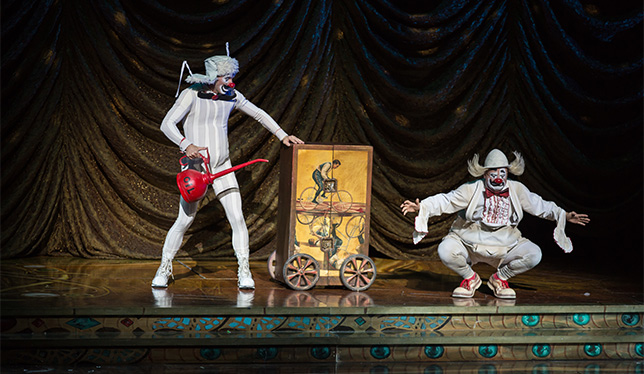Parents might be convinced of the value of helping their children become media literate and technologically literate, but few may have considered the benefits of being circus literate. That’s the goal of literature professor Patrick Leroux, a playwright, artist and theatre director who also happens to be one of Canada’s pre-eminent circus scholars. He is examining how the “physical literacy” related to the art of circus training can be used as a tool to encourage kids to move.
“Kids are getting less and less physical activity in schools,” says Dr. Leroux, who is an associate professor of English and French studies at Concordia University. In recognizing that not everybody is equally physically inclined, Dr. Leroux is looking at whether circus training can take kids beyond the sports model of movement, “so they don’t always feel like they’re in gym class.” To that end, Dr. Leroux is collaborating with a team of researchers from Halifax, Winnipeg and colleagues at Université de Montreal that will travel across the country and study circus arts programs for children and assess them in terms of fostering physical literacy, creativity and resilience.
For his part, Dr. Leroux studies what he calls “the grammar and poetics of movement.” His work attempts to establish a grammar of contemporary circus by analyzing things like how it tells stories differently. In order to get up close and personal with his research subjects – a sinewy crew which includes acrobats, jugglers and gymnastic trainers – he has taken positions as resident scholar and research associate at Montreal’s École nationale de cirque (National Circus School), the only state-funded elite training facility in North America. It’s all part of Dr. Leroux’s creative and increasingly collaborative approach to understanding how circus may be distinct from other art forms and how it grew to be so important in Quebec and abroad.
“Circus has accrued significant cultural capital in a way we might not have expected,” he says. For hundreds of years, Canada’s contribution to the artistic industry was limited to being great spectators and exporters of talent, but today the country is one of the top three circus hubs internationally. He says the contemporary scene emerged, in part, from rural Quebec in the late 1970s where street performers delighted audiences in small towns by walking on stilts, juggling and breathing fire. Today, Quebec is not only home to the most renowned circus in the world, Cirque du Soleil (“It’s big – Disney big,” he says), but, thanks to Dr. Leroux, the province is the centre of the emerging interdisciplinary field of circus studies.
A few years ago, Dr. Leroux realized that people who were studying contemporary circus were working alone in a wide range of disciplines from theatre, dance and physical literacy to kinesiology, engineering and economics. He wanted to bring them all together to encourage collaboration and discussion around such questions as: Why does Cirque du Soleil dominate the contemporary circus scene; and what is the impact of the circus on the performing arts? In 2011, he founded the Montreal Working Group on Circus Research that has about 20 active members who get together several times a year. “I find myself now working with people I never would have imagined talking to,” he says. “Engineers and design students, a cultural anthropologist from MIT – we are all talking the same language. We are pooling resources.”
In the coming months, while working on a book-length study of Cirque du Soleil in Las Vegas, Dr. Leroux will also spend time in Ecuador as part of another research project that will examine the arts-for-social-change model of circus that has been rolled out by Cirque du Monde, the philanthropic division of Cirque du Soleil, in underprivileged communities around the world. The team will study a group of kids who had signed up to participate in circus training, then became volunteers and then went on to become circus trainers themselves. “We are interested in understanding the impact of circus not just on the individuals but on everyone around them,” says Dr. Leroux. “We also want to understand the models for support that exist in those communities.”
Working with the performers in Ecuador has become a labour of love, he says. In fact, he sometimes finds himself trading his researcher hat for his theatre director’s hat by helping out with the troupe’s productions. “I tend get my hands dirty wherever I go.”
